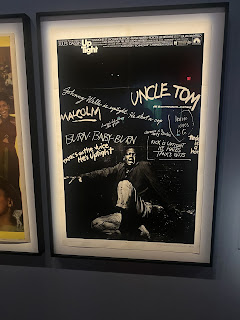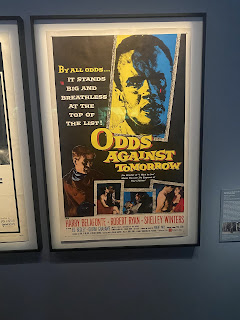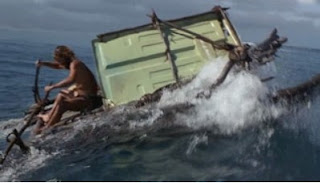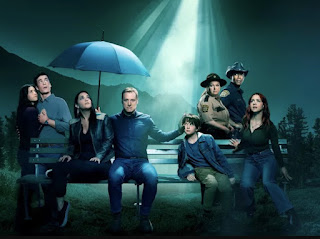I love local oddities. The small things full of mystery or malice that sit in big cities that everyone sees, but that are so a part of the landscape that your eyes just pass over them. I'm not talking about oddity museums. Those places are cool, but they have the feeling of trying just a little too hard. Of curating the unknowable (an action that then makes it all kind of bland). I'm talking about the places out there in the world. Places you can go to, if you only know they're there. The Paris catacombs. The Sedlec Ossuary. Or, closer me, the Villisca Axe Murder House.
But my favorite oddity has always been the islands of New York City.
In one of the densest cities in the world, and there's all this land out there, untouched, unused, abandoned. Sometimes for good reason. Sometimes because of bureaucratic hiccups. Sometimes because it's just always been that way.
Nick Kolakoski, the author of Hell of a Mess, out now from Shotgun Honey, shares my fascination, and we recently traded emails talking about the islands of New York City, where Hell of a Mess reaches its bloody, thrilling climax.
Make sure you pick up Hell of a Mess when you're done reading. But now, please enjoy Nick and I chatting about the islands around New York. I promise you'll learn something, and you'll be even more excited about Nick's book when you're done.
Hell of a Mess features... I was going to say, "one of my favorite weird New York tidbits", but it's actually just one of my favorite weird tidbits, period; the islands of New York City. As someone who has been in NYC a long time, and as someone who grooves to a lot of similarly weird things as I do, what can you tell me about the Islands of NYC? How many are there?
NYC is ultimately a constellation of islands poking into the Atlantic. Some of the biggest are instantly recognizable—Manhattan, Staten Island, etc. But there are a cluster of little ones sprinkled in New York Harbor and Long Island Sound that have been used for all kinds of liminal purposes over the years—for prisons, as pauper’s graves, as holding places for the mentally ill and the desperately sick.
With the exception of Governor’s Island, which was primarily a military facility and sits off the tip of lower Manhattan, and Roosevelt Island, which sits smack-dab in the middle of the East River, most of these islands are relatively out of sight. You see Riker’s, the prison island, when you land at La Guardia, but otherwise it’s at the far end of a closed-off bridge; you can’t really get a close-up view of Hart or North Brother, because they’re closed to civilian traffic. So there’s an inherent spookiness to them.
What's the coolest island of New York? The scariest?
Governor’s Island is easily New York’s coolest almost-deserted island. It has a Civil War fort, the crumbling remains of a military base (complete with admirals’ mansions), ridiculously landscaped hills, and a “glamping” compound where you can stay in a huge tent for some insanely high fee per night. There are great art exhibitions, outdoor movies, and a near-total lack of cars. It is, in short, an absolutely perfect place to spend an afternoon, especially if there’s an exhibition of some sort.
Hart Island is the scariest of all the islands around New York. Even more than Riker’s, it’s the point of no return. There are more than one million people buried on the island in communal graves, with 1,500 added to their number every year. Whatever happens, you don’t want to end up on Hart.
Do you know anyone who has been to any of the islands? Or did you go to one of the islands for research for Hell of a Mess?
The climactic action of “Hell of a Mess” is set on North Brother Island, which is strictly off-limits to anyone who’s not a city employee. North Brother Island was a quarantine facility—it hosted Typhoid Mary—and a rehab facility, but now it’s abandoned. It has a lot of bad karma, over and above the people forcibly kept on it for decades—in 1904, a huge passenger ship named the “General Slocum” caught fire and burned in Long Island Sound, and the bodies ended up on the shores of North Brother Island.
Today, its buildings (such as a hospital and a lighthouse) have crumbled back to nature, and all the roads and former paths are overgrown. It’s the perfect place to set up a cat-and-mouse situation without any hope of outside help, especially in the midst of a hurricane, which is why I used it for the book. Since I couldn’t actually go to the island, I relied on photographs (there are many), as well as firsthand accounts, video, and articles in places like Atlas Obscura.
How did you decide to incorporate the islands of New York City into Hell of a Mess? Did it happen organically, or is this something you've been wanting to work into something for a while?
I spend a lot of time on Roosevelt Island, which at one point was another infamous “plague island.” For decades, it hosted a sanitarium for the infected on the southern end of the island, and a mental institution on the northern end, with a prison somewhere in the middle. Now it’s a beautiful, quiet space with funky apartment buildings, a cancer center, and the FDR Memorial. I’d wanted to set a story or part of a novel on Roosevelt Island, but I couldn’t quite make it work.
I also really like the idea of setting something on Governor’s Island. During the pandemic, I toyed with the idea of setting an Agatha Christie-style murder mystery on it, but again, nothing quite worked.
Clearly, I had islands on the brain. When it came time to write “Hell of a Mess,” I knew I needed an isolated place for the finale—a location where characters could stalk one another, and even set off a few explosions, without calling down the NYPD and the FBI within minutes. Of course, I instantly thought of an island. Why not North Brother? It’s appropriately dark and overgrown, with no help in sight. Plus, there are lots of death traps you can set up in an abandoned hospital.
Can you recommend any other books, either novels or non-fiction, about the Islands of NYC?
Chris Holm’s “Child Zero” also has its climax on North Brother Island. I’m reading that book as soon as it came out, because I love Chris’s stuff, and I get to that part and start screaming—literally screaming—first, because he did such an amazing job, and it’s suspenseful as hell, but also because I realized I no longer had a unique lock on the location. But it’s fine; I heartily recommend that book for anyone who’s a fan of science-infused thrillers, or just thrillers in general.
Finally, are there any other weird New York City landmarks or legends that you hope to include in future works?
I haven’t discounted using Governor’s Island in something. A closed-room mystery. Friggin’ vampires. Whatever—it’s too great a location.
Thank you to NIck Kolakowski for stopping by today. And don't forget to pick up Hell of a Mess! Also, if you have any favorite NYC Island stories, drop them in the comments.






















